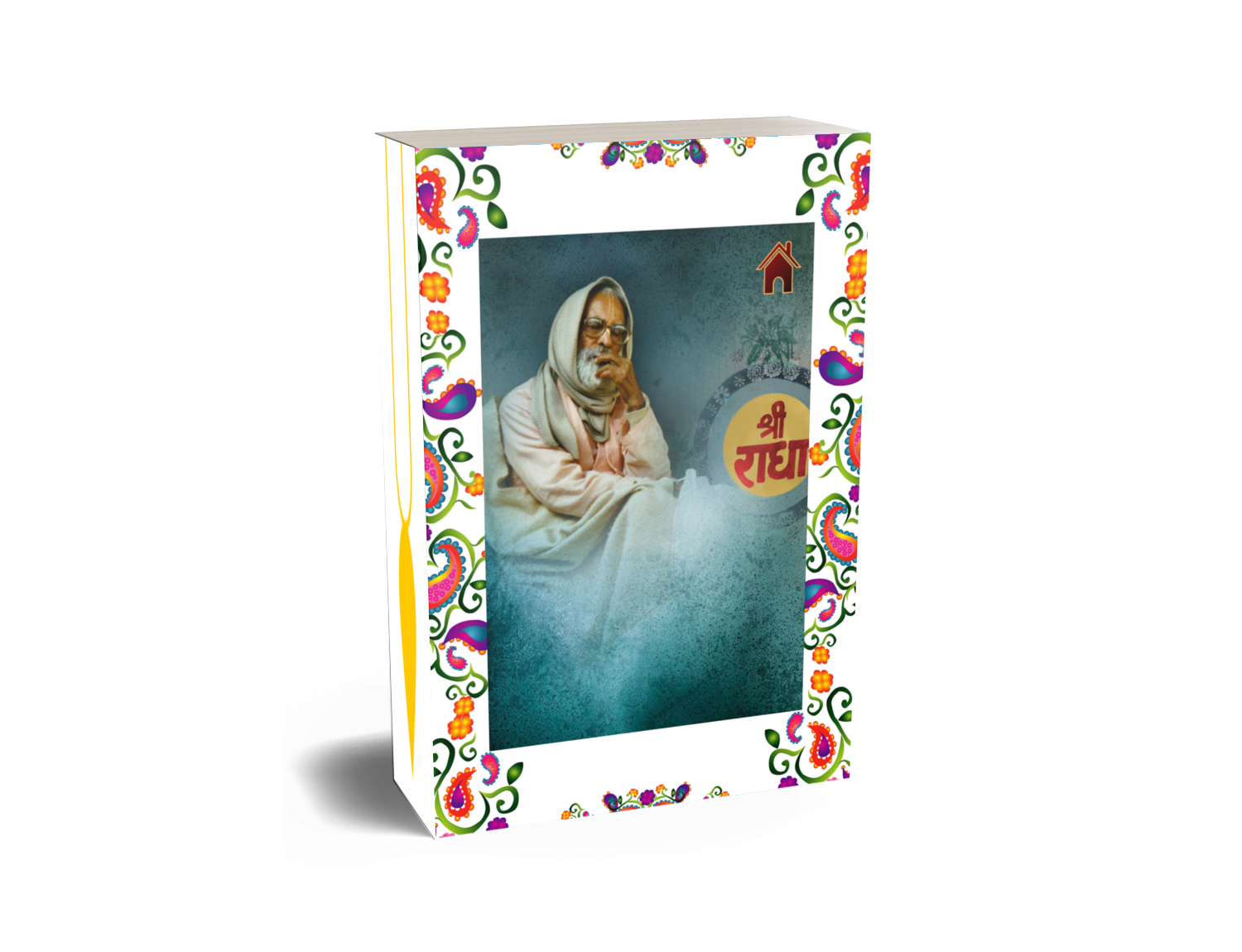
चतुर्विधा भजन्ते मां जना: सुकृतिनोऽर्जुन ।
आर्तो जिज्ञासुरर्थार्थी ज्ञानी च भरतर्षभ ॥ १६ ॥
catur-vidhā bhajante māṁ janāḥ sukṛtino ’rjuna
ārto jijñāsur arthārthī jñānī ca bharatarṣabha
catur-vidhāḥ – four kinds; bhajante – worship; mām – Me; janāḥ – persons situated in regulated life; sukṛtinaḥ – of pious; arjuna – O Arjuna; ārta – the distressed (by disease, enemies and fear); jijñāsuḥ – the inquisitive (desirous of self-realization); artha-arthī – the seeker of bodily happiness, heavenly enjoyment and wealth; jñānī – the man in knowledge; ca – and; bharata-ṛṣabha – best of the dynasty of Bharata.
O best of the Bharata dynasty, there are four types of pious men who perform worship of Me: the distressed (ārta), the inquisitive (jijñāsu), the seeker of wealth (arthārthī) and the man of wisdom (jñānī).
Bhagavad-gītā, Chapter Seven, Verse Sixteen

The following is an excerpt from Jaiva-dharma, Chapter 19, Commentary (at the end of this chapter) of Śrīla Bhaktivedānta Nārāyaṇa Mahārāja
Vrajanātha: It is said in Bhagavad-gītā that four kinds of people perform bhakti: ārta (those who are distressed), 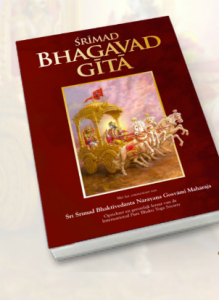 jijñāsu (the inquisitive), arthārthī (those who desire wealth), and jñānīs (those who are searching for knowledge of the Absolute). What kind of bhakti are they qualified for?
jijñāsu (the inquisitive), arthārthī (those who desire wealth), and jñānīs (those who are searching for knowledge of the Absolute). What kind of bhakti are they qualified for?
Bābājī: When they associate with saintly sādhus, their distress, their inquisitiveness, their desire for wealth, and their desire for knowledge are removed, and they develop faith in unalloyed devotional service. Then they immediately become qualified for engaging in bhakti. The prominent examples of this are Gajendra, Śaunaka and the other ṛṣis in Naimiṣāraṇya, Dhruva, and the four Kumāras respectively.
Gajendra is an example of a person in distress (ārta). The following pastime took place during the fourth manvantara. An elephant called Gajendra was the leader of many strong elephants, and he lived with many she-elephants in the deep jungle in a valley of Trikuṭa, the King of mountains. In the valley was a large, beautiful, and inviting lake, and one day Gajendra was fearlessly absorbed in sporting in the lake 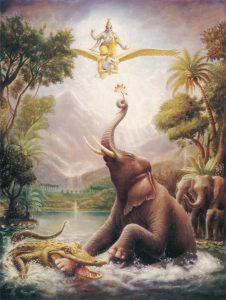 with his female elephants and children. All of a sudden, a powerful crocodile angrily caught hold of his leg. Gajendra used all his strength to try to free himself, but the mighty elephant could not get free, even after struggling for a thousand years. Slowly, Gajendra began to lose strength. When he saw that he had no other protection, he took complete and exclusive shelter of Śrī Bhagavān. In great distress, he began to chant eloquent Sanskrit ślokas that he had learned in his previous birth as King Indradyumna. Śrī Bhagavān arrived there riding on Garuḍa and freed Gajendra by cutting open the crocodile’s mouth with His cakra.
with his female elephants and children. All of a sudden, a powerful crocodile angrily caught hold of his leg. Gajendra used all his strength to try to free himself, but the mighty elephant could not get free, even after struggling for a thousand years. Slowly, Gajendra began to lose strength. When he saw that he had no other protection, he took complete and exclusive shelter of Śrī Bhagavān. In great distress, he began to chant eloquent Sanskrit ślokas that he had learned in his previous birth as King Indradyumna. Śrī Bhagavān arrived there riding on Garuḍa and freed Gajendra by cutting open the crocodile’s mouth with His cakra.
In his previous life, Gajendra had been King Indradyumna, ruler of the state of Draviḍa, and a member of the Pāṇḍava dynasty. Once Mahāṛṣi Agastya came to visit Indradyumna, but when he arrived there, the king was worshipping Śrī Bhagavān in deep trance, and therefore could not greet the ṛṣi. Due to this offence, Mahāṛṣi Agastya cursed the king to take birth as an elephant.
Śaunaka and the other ṛṣis in Naimiṣāraṇya are examples of those who are inquisitive (jijñāsu). Once, 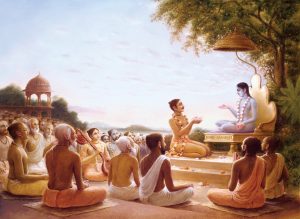 Śaunaka and other ṛṣis organized sacrificial yajñas for a thousand years in the holy place of Naimiṣāraṇya, hoping to attain the supreme benediction. After some time, they lost all hope of attaining their desired goal by that process, but they attained perfection through the answers that Śrī Suta Gosvāmī (the disciple of Lord Balarāma and Śrī Śukadeva Gosvāmī) gave to their questions. The six questions that they asked him are:
Śaunaka and other ṛṣis organized sacrificial yajñas for a thousand years in the holy place of Naimiṣāraṇya, hoping to attain the supreme benediction. After some time, they lost all hope of attaining their desired goal by that process, but they attained perfection through the answers that Śrī Suta Gosvāmī (the disciple of Lord Balarāma and Śrī Śukadeva Gosvāmī) gave to their questions. The six questions that they asked him are:
(1) What is the ultimate benediction for the jīvas?
(2) What topic can we hear that will please the life of all souls, Paramātmā Śrī Hari?
(3) What were the purposes that Vāsudeva Śrī Kṛṣṇa desired to fulfil when He appeared from Devakī’s womb?
(4) What pastimes did Bhagavān Vāsudeva perform in His different avatāras?
(5) Please describe the qualities and glories of Śrī Hari.
(6) Where did dharma take shelter when Śrī Kṛṣṇa returned to His own abode?
All these ṛṣis took shelter of Śrī Suta Gosvāmī as guru although they took birth in high-caste brāhmaṇa families, whereas he took birth in a lower caste. When they expressed their inquisitiveness to Śrī Suta Gosvāmī in a simple-hearted way, this dearmost disciple of Śrī Śukadeva Gosvāmī answered all their questions with gentle affection. When they heard his answers, they all attained supreme perfection.
Dhruva is an example of one who desires wealth (arthārthī). His pastime occurred at the beginning of creation. 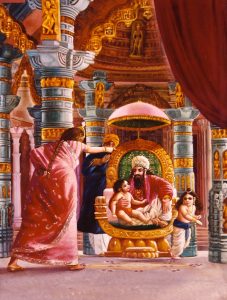 Emperor Uttānapāda, who was born in the dynasty of Svāyambhuva Manu, had two queens. The elder queen was named Sunīti, while the younger, who controlled the king, was called Suruci. Sunīti had a son by the name of Dhruva. Child Dhruva was deprived of his father’s affection, and could not tolerate his stepmother’s tortures. Following his mother’s advice, he went into the deep forest, where he became completely absorbed in the very austere and difficult worship of the lotus-eyed Śrī Hari. His prayer was not to attain the Supreme, but to fulfil his material desire for a kingdom. However, by the mercy of Śrī Bhagavān, not only was his ambition for a kingdom fulfilled, but he also obtained pure bhakti. If one performs bhakti with undivided attention, even to fulfil a material desire, one always attains all auspiciousness in the end.
Emperor Uttānapāda, who was born in the dynasty of Svāyambhuva Manu, had two queens. The elder queen was named Sunīti, while the younger, who controlled the king, was called Suruci. Sunīti had a son by the name of Dhruva. Child Dhruva was deprived of his father’s affection, and could not tolerate his stepmother’s tortures. Following his mother’s advice, he went into the deep forest, where he became completely absorbed in the very austere and difficult worship of the lotus-eyed Śrī Hari. His prayer was not to attain the Supreme, but to fulfil his material desire for a kingdom. However, by the mercy of Śrī Bhagavān, not only was his ambition for a kingdom fulfilled, but he also obtained pure bhakti. If one performs bhakti with undivided attention, even to fulfil a material desire, one always attains all auspiciousness in the end.
The Four Kumāras, called Sanaka, Sanātana, Sanandana, and Sanat are examples of those who search for knowledge of the Absolute (jñānis). Brahmā created them from his mind at 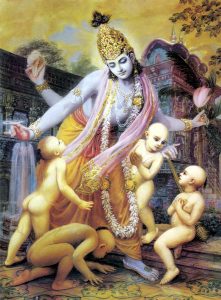 the beginning of the creation which is why they are called his mānasa-putra (sons born of his mind). They were completely free from worldly attraction because of their profound knowledge. Thus, they did not give any assistance to their father in the task of creation because they had developed an inclination for impersonal speculation (brahma-jñāna). Brahmā was extremely displeased with this, and he prayed to Bhagavān Śrī Hari for the welfare of his sons. Śrī Bhagavān was pleased by Brahmā’s prayers, and in His Haṁsa (swan) avatāra, He attracted their minds away from dry impersonal knowledge to knowledge of pure devotional service on the absolute platform. Because of this, Sanaka Kumāra and his brothers are known as jñānī-bhaktas. They are the originators of the Nimbāditya disciplic succession.
the beginning of the creation which is why they are called his mānasa-putra (sons born of his mind). They were completely free from worldly attraction because of their profound knowledge. Thus, they did not give any assistance to their father in the task of creation because they had developed an inclination for impersonal speculation (brahma-jñāna). Brahmā was extremely displeased with this, and he prayed to Bhagavān Śrī Hari for the welfare of his sons. Śrī Bhagavān was pleased by Brahmā’s prayers, and in His Haṁsa (swan) avatāra, He attracted their minds away from dry impersonal knowledge to knowledge of pure devotional service on the absolute platform. Because of this, Sanaka Kumāra and his brothers are known as jñānī-bhaktas. They are the originators of the Nimbāditya disciplic succession.
Image/Art made possible by Pixabay.com & Krishnapath.org








